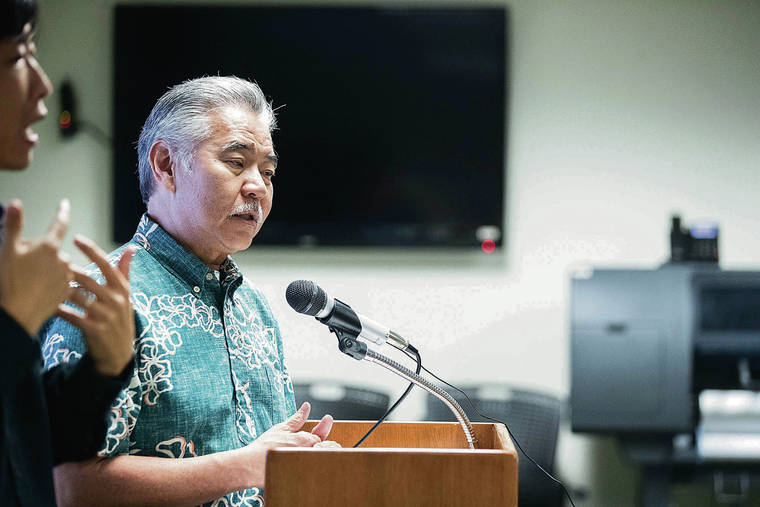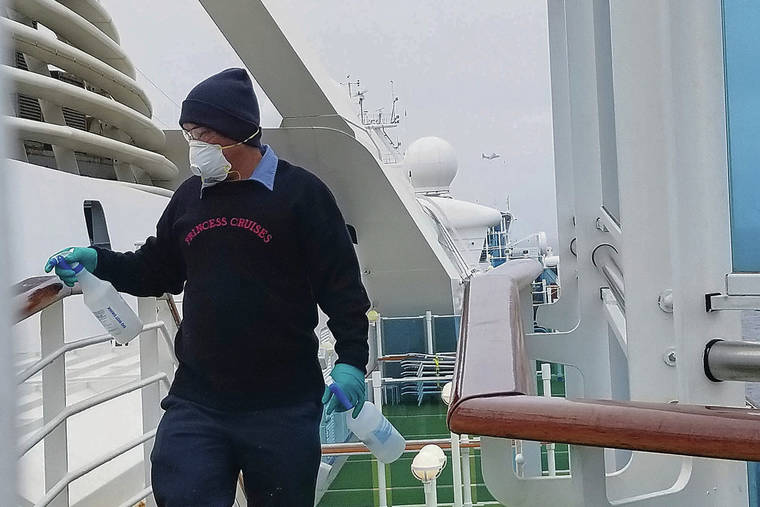Hawaii resident who traveled on the Grand Princess cruise ship tests positive for the coronavirus


CINDY ELLEN RUSSELL / CRUSSELL@STARADVERTISER.COM
“Anyone that has kupuna they believe are at risk or has respiratory challenges, certainly we would encourage them to be smart about it. Avoid large events with large crowds,” said Gov. David Ige at Friday’s news conference.

MICHELE SMITH VIA ASSOCIATED PRESS
A worker cleaned a railing Thursday on the Grand Princess cruise ship, anchored off Northern California. Twenty one people on board have tested positive for the coronavirus since it left Hawaii last week.



Hawaii has confirmed its first case of the coronavirus in a resident who traveled on a cruise ship in February and tested positive after returning to Oahu.
The resident was on the Grand Princess voyage from San Francisco to Mexico from Feb. 11 to 21 and flew back to Hawaii from Mexico, later became ill and tested positive for the virus Friday. The individual was treated at Kaiser Permanente, which has placed two staff members and a physician in home quarantine for the next 14 days as a precaution.
A Kaiser representative did not disclose which clinic location the patient visited.
Local health officials have so far not identified any close contacts of the patient, who they said is “doing fine” in home quarantine with mild to moderate symptoms. They did not reveal whether the individual lives with family.
“We don’t believe there has been any community spread (in Hawaii) at this time,” Gov. David Ige said Friday at an emergency news conference.
State authorities didn’t know which airline the individual flew on, but said the patient did not have symptoms at the time so there was “no risk” while traveling back to Oahu. However, the Centers for Disease Control and Prevention has noted it is possible for spread to occur before symptoms, though that is not the primary mode of transmission.
Don't miss out on what's happening!
Stay in touch with breaking news, as it happens, conveniently in your email inbox. It's FREE!
Meanwhile, officials are scrambling to find any close contacts of the 21 people who tested positive for the coronavirus after stopping on four of the main Hawaiian Islands aboard a subsequent Grand Princess cruise last week.
The same ship docked at Kauai’s Nawiliwili Harbor on Feb. 26; Honolulu on Feb. 27; Lahaina, Maui, on Friday; and Hilo on Saturday before departing the next day for San Francisco, its port of origin.
“With each of these incidences the likelihood goes way up that some of our people will become infected,” Lt. Gov. Josh Green told the Honolulu Star-Advertiser. Separately, a couple from Japan were found to be infected after returning home from a trip to Hawaii from Jan. 28 to Feb. 7.
Health investigators said they will search on all islands for anyone exposed to the passengers who disembarked in Hawaii to determine any risk in the communities.
The Grand Princess was carrying more than 3,300 people: 2,200 passengers and 1,100 crew members, including 19 who have now tested positive for the virus known as COVID-19. A crew member who fell ill on the Hawaii voyage was admitted to Hilo Medical Center but tested negative Tuesday.
“We still have a lot to learn about what happened and the circumstances here,” said state Health Director Bruce Anderson. The ship currently waiting off the coast of San Francisco Opens in a new tab has about four passengers from Hawaii, he said.
The DOH, which has tested only eight people for COVID-19 in the islands, is planning for more broader community testing as early as next week. Some doctors are frustrated that patients with respiratory illnesses not associated with the flu have been denied testing by the Health Department.
“The number of tests is currently unacceptable, and the medical community has made it very loud and clear that we need to be maximizing our test capabilities,” Green said, adding there are 2,000 test kits currently in state. “If we accelerate we can do up to 500 tests per week and maximize capacity.”
Ige noted the focus has been on those who are “most sick.”
“We want to be able to have tests available for those who might need them the most,” he said.
At least 10 people on the first cruise from San Francisco to Mexico contracted the virus, including an elderly man who became California’s first fatality.
Ige declared a state of emergency Wednesday following the disclosure that the California man was aboard the cruise ship to Mexico.
With the first case of coronavirus, the governor said Hawaii residents should “assess their situation.”
“Anyone that has kupuna they believe are at risk or has respiratory challenges, certainly we would encourage them to be smart about it,” he said. “Avoid large events with large crowds.”
Private labs such as Clinical Labs of Hawaii, Diagnostic Laboratory Services and Kaiser are ramping up as fast as they can to be able to test for the new coronavirus. Testing will be covered by the state and private health insurers.
The state is also considering establishing mobile screening clinics where people who have mild symptoms can drive by and get tested so they don’t have to go into emergency rooms, community health centers or private clinics and can wait for the results at home.
“If things get worse and we end up having cases of COVID-19 here, that will become a reality,” Green said.
The health care industry has estimated it might require more than $44 million to purchase additional equipment — including ventilators, masks and other protective gear — if a long-running outbreak occurs in Hawaii.
The federal government has appropriated $8.3 billion, including $1 billion earmarked for states to fight the coronavirus.
“There’s lots of potential needs, but it’s all meant to protect our people and protect our economy,” Green said.



